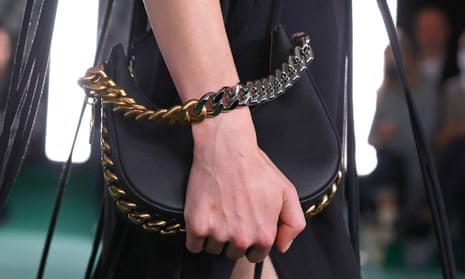Would you ever wear shoes made from “grape leather”? Or gloves in “cactus leather”? What about a “kombucha leather” jacket and a “mushroom leather” bag?
With the drive towards more sustainable fashion, the burgeoning world of animal-free “alt leathers” is becoming increasingly mainstream. This week saw the launch of new sustainable trainer brand Lerins, from Dune founder Daniel Rubin, including £130 shoes made with a leather-like material created from grape skins left over from wine-making.
So-called “plant-based leather” promises great benefits for the planet. Not only is Lerins upcycling an existing waste stream (as is also the case for “leathers” made from apples, bananas and pineapples), it’s also disconnecting from the cattle industry, and in doing so, avoids the issues of greenhouse gas emissions, deforestation and animal welfare.
Lerins joins a growing number of brands working with plant-based leather alternatives, among them Allbirds, Hermès, Reformation and Stella McCartney.
And it’s not just “plant-based leather” that is getting attention. This week, Leonardo DiCaprio and Kering, parent company of fashion brands such as Gucci, Saint Laurent and Balenciaga, invested “significant” sums in the Californian lab-grown leather startup VitroLabs. The process of lab-grown leather involves the cultivation of stem-cells in order to replicate animal hides, thus the leather is expected to be as strong and long-lasting as conventional leather.

“We’re at a turning point,” says the American journalist and author, Dana Thomas. “When I wrote Fashionopolis [in 2019, covering the future of sustainable fashion], this was in the testing phase, now it’s being rolled out commercially – it’s thrilling to see it happening.”
In August, Stella McCartney is launching grape leather shoes and handbags, and later this year, a mushroom leather bag, made from mycelium, the root structure of mushrooms. Allbirds’ first plant leather shoes, made with vegetable oil and natural rubber, are expected “in due course”.
Nicole Rawling, the CEO of the California-based charity Material Innovation Initiative, which brings together brands, scientists and investors to accelerate this next generation of animal-free materials, says last year $980m of funding was raised for fabrics that replace animal-based materials (including silk and wool).
However, it’s proving hard for plant-based leather alternatives to compete with the durability of bovine leather, which is problematic if it affects a product’s lifespan. Take plant-based shoes, says Dr Laetitia Forst, postdoctoral researcher of sustainable fashion at the University of the Arts London. “Even if their initial impact is lower, if you’re having to replace them every year as opposed to every 10 years, their overall impact will be much higher.”
The solution, so far, has been – controversially – plastic. Many of these leather alternatives use a polyurethane (PU) coating in order to improve durability. (Both McCartney and Lerins work with the biomaterial company Vegea, which uses a water-based polyurethane, and says it is “the most environmentally responsible polyurethane available”; Allbirds claims its “plant leather” is 100% plastic-free.)
“If you’re combining natural and synthetic materials, there will be issues at the end-of-life stage,” says Philippa Grogan of Eco-Age. “The plastics will compromise a product’s biodegradability.”
There is no question that the plant-based leather industry wants to crack this problem: “No one is happy to have petrochemicals in their products,” says Rawling. She is optimistic that competition will force companies to develop more sustainable solutions.








